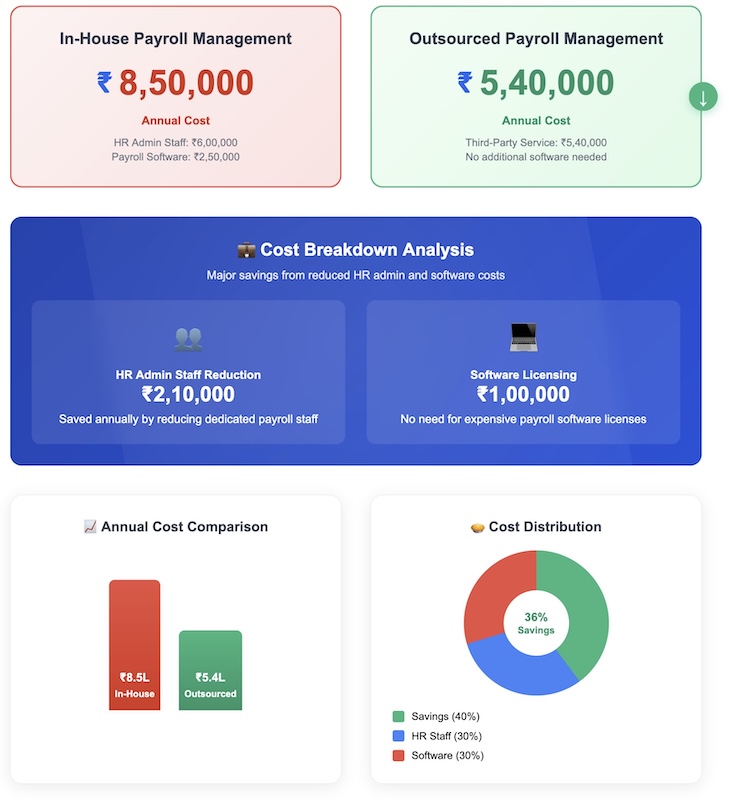Summary
Employee outsourcing helps Indian businesses reduce costs, access specialized talent, and focus on core activities. Companies partner with third-party providers to handle HR functions, payroll management, and compliance requirements. This strategic approach delivers cost savings of 30-40% while improving operational efficiency.
Key Points
- Reduces operational costs by 30-40% compared to in-house hiring
- Provides access to specialized skills and expert talent pools
- Eliminates HR administrative burden and compliance headaches
- Enables faster project completion and improved business focus
- Offers flexible workforce solutions for growing companies
Key Takeaways
- Choose agencies with proven compliance management track records
- Verify payroll processing capabilities and technology solutions used
- Confirm legal expertise in local and national regulations
- Establish clear service level agreements and timelines
- Review cost structures and service packages carefully
What is Employee Outsourcing?
Employee outsourcing means hiring external agencies to manage your workforce needs. Instead of building an internal HR department, you partner with specialists who handle everything from recruitment to payroll.
Think of it as having a complete HR team without the overhead costs. These agencies become your extended workforce, managing employees on your behalf while you focus on growing your business.
The concept has evolved significantly in India. Remote work trends and digital transformation have made outsourcing more accessible and efficient than ever before.
How Employee Outsourcing Works in India
When you outsource employees, a third-party provider becomes the official employer. They handle all legal responsibilities while your employees work for your business objectives.
This arrangement creates a three-way relationship. You define the work requirements, the agency manages the employment relationship, and the employees deliver results for your projects.
The agency takes care of contracts, benefits, statutory compliance, and performance management. You get skilled workers without the administrative complexity.
Core Services Included
Professional outsourcing agencies offer comprehensive employee management services:
Recruitment and Selection: Complete hiring process from job posting to final selection. Background verification, skill assessment, and interview coordination.
Payroll Processing: Monthly salary calculations, tax deductions, and timely payments. Integration with your existing systems and real-time reporting.
Compliance Management: Labor law adherence across different Indian states. Statutory filing, documentation, and regulatory updates.
Benefits Administration: Medical insurance, provident fund, and employee welfare schemes. Claims processing and vendor management.
Performance Monitoring: Regular evaluations, feedback systems, and improvement plans. Data-driven insights for better workforce decisions.
Why Indian Businesses Choose Employee Outsourcing
Cost Reduction Benefits
Outsourcing delivers immediate cost advantages. You eliminate recruitment expenses, training costs, and infrastructure investments needed for full-time employees.
A typical company saves 30-40% on operational costs through outsourcing. These savings come from shared resources, economies of scale, and reduced administrative overhead.
Consider a software company needing 10 developers. Hiring internally requires office space, equipment, HR staff, and benefits administration. Outsourcing provides the same talent at a fraction of the cost.

Access to Specialized Skills
Finding specific technical skills in India's competitive job market takes months. Outsourcing agencies maintain ready talent pools with pre-verified expertise.
Need blockchain developers for a three-month project? An agency can provide qualified professionals within weeks. This speed advantage helps you capture market opportunities faster.
The same principle applies to niche areas like AI development, digital marketing, or regulatory compliance. Agencies invest in training specialists you might never need full-time.
Focus on Core Business Activities
Managing employees consumes significant leadership time. HR issues, payroll problems, and compliance requirements distract from strategic priorities.
Outsourcing frees your management team to focus on revenue-generating activities. You can pursue new markets, develop products, or improve customer relationships instead of handling administrative tasks.
This focus shift often leads to faster business growth and improved profitability. Companies report 25-30% productivity improvements after outsourcing non-core functions.
Critical Success Factors for Employee Outsourcing
Legal and Regulatory Compliance
India's complex labor laws vary significantly across states. Each region has different minimum wage requirements, working hour regulations, and statutory obligations.
Professional agencies maintain legal teams that stay updated on regulatory changes. They handle PF registrations, ESI compliance, and labor department interactions.
However, not all agencies have this expertise. Choosing inexperienced providers can create serious legal liabilities for your business. Due diligence is essential.
Technology Infrastructure and Payroll Management
Modern payroll systems require sophisticated technology platforms. Manual processing leads to errors, delays, and compliance issues.
Look for agencies using cloud-based payroll solutions with real-time reporting capabilities. They should offer employee self-service portals and integration with your existing systems.
Payment reliability is crucial. Late salary payments damage employee morale and can trigger legal complications. Verify the agency's track record for timely payments.

Service Quality and Communication
Clear communication channels prevent misunderstandings and project delays. Establish regular review meetings and progress reporting mechanisms.
Define service level agreements covering response times, resolution procedures, and escalation processes. This clarity protects both parties and sets performance expectations.
Consider agencies with dedicated account management teams. Personal relationships improve service quality and problem resolution speed.
Common Challenges and Solutions
Managing Remote Teams Effectively
Outsourced employees often work remotely, creating management challenges. Distance can impact collaboration, communication, and team cohesion.
Implement digital collaboration tools like Slack, Microsoft Teams, or project management platforms. Regular video calls help maintain personal connections and team alignment.
Set clear performance metrics and regular check-in schedules. This structure provides accountability while respecting work flexibility.
Quality Control and Standards
Maintaining consistent work quality across outsourced teams requires clear guidelines and regular monitoring.
Develop detailed process documentation and quality checklists. Share these resources during onboarding to establish expectations from day one.
Implement feedback loops and continuous improvement processes. Regular performance reviews help identify issues before they impact project outcomes.
Cultural and Communication Barriers
Working with diverse teams can create cultural misunderstandings and communication gaps.
Invest in cultural orientation sessions for both internal and outsourced team members. Understanding different working styles improves collaboration effectiveness.
Encourage open communication and create safe spaces for questions and clarifications. This openness prevents small issues from becoming major problems.
Selecting the Right Outsourcing Partner
Experience and Track Record
Look for agencies with proven experience in your industry sector. They understand specific requirements, common challenges, and best practices.
Request client references and case studies demonstrating successful partnerships. Long-term client relationships indicate reliable service delivery.
Verify their compliance history and legal standing. Check for any pending litigation or regulatory violations that might affect your business.

Technology Capabilities
Modern outsourcing requires advanced technology platforms. Evaluate their software solutions, security measures, and integration capabilities.
Ask about backup systems, disaster recovery plans, and data protection protocols. Your business data must remain secure and accessible.
Consider their reporting capabilities and dashboard functionality. Real-time visibility into workforce metrics helps you make informed decisions.
Scalability and Flexibility
Your workforce needs will change as your business grows. Choose agencies that can scale services up or down based on demand.
Discuss pricing models for different scenarios. Flexible contracts prevent you from paying for unused capacity during slow periods.
Evaluate their talent acquisition capabilities. Can they quickly recruit additional specialists when you need to expand project teams?
Cost Analysis and ROI Considerations
Direct Cost Savings
Compare total employment costs including salaries, benefits, infrastructure, and administrative expenses. Outsourcing typically reduces these costs by 30-40%.
Factor in hidden costs like recruitment fees, training expenses, and employee turnover. These indirect costs often exceed direct salary expenses.
Consider opportunity costs of management time spent on HR activities. This time could generate revenue through business development or strategic planning.
Long-term Financial Benefits
Outsourcing converts fixed employment costs into variable expenses. This flexibility improves cash flow management and reduces financial risk.
You avoid large upfront investments in office space, equipment, and HR systems. These capital savings can fund growth initiatives or new market expansion.
Calculate the ROI including productivity improvements, faster project completion, and reduced administrative overhead. Most companies achieve positive ROI within 6-12 months.
Implementation Best Practices
Transition Planning
Develop a detailed transition plan covering timelines, responsibilities, and success metrics. Clear planning prevents disruption to ongoing operations.
Communicate changes to your existing team early and transparently. Address concerns about job security and explain how outsourcing supports company growth.
Start with pilot projects to test the partnership before committing to large-scale outsourcing. This approach reduces risk and allows for adjustments.
Performance Monitoring
Establish key performance indicators covering quality, timeliness, and cost metrics. Regular monitoring helps identify issues early and maintain service standards.
Create feedback mechanisms for both your team and outsourced workers. This input helps improve processes and strengthen working relationships.
Document lessons learned and best practices for future reference. This knowledge base improves future outsourcing decisions and implementations.
Future of Employee Outsourcing in India
Technology Trends
Artificial intelligence and automation are transforming outsourcing services. AI-powered recruitment tools and automated payroll systems improve efficiency and accuracy.
Remote work technologies continue evolving, making location-independent collaboration more effective. This trend expands talent access beyond geographic boundaries.
Blockchain technology may revolutionize contract management and payments, providing greater transparency and security for outsourcing relationships.

Market Evolution
The Indian outsourcing market is becoming more specialized and sophisticated. Agencies are developing niche expertise in specific industries and functions.
Hybrid models combining permanent employees with outsourced specialists are gaining popularity. This approach provides stability while maintaining flexibility.
Regulatory changes continue shaping the outsourcing landscape. Staying informed about legal developments helps you make compliant and strategic decisions.
FAQ Section
How much can my company save through employee outsourcing?
Most Indian businesses save 30-40% on operational costs through outsourcing. Savings come from reduced infrastructure, administrative overhead, and recruitment expenses. Actual savings depend on your current cost structure and the services you outsource.
What happens if the outsourcing agency fails to pay employees on time?
While the agency handles payroll, you remain ultimately responsible for employee welfare. Choose agencies with proven payment track records and financial stability. Include penalty clauses in contracts for late payments and maintain emergency payment procedures.
How do I maintain quality control with outsourced employees?
Establish clear performance standards, regular review processes, and quality metrics from the start. Use project management tools for visibility and conduct regular feedback sessions. Strong communication and well-defined expectations prevent quality issues.
Can I outsource employees for short-term projects?
Yes, outsourcing works well for temporary staffing needs. Many agencies offer flexible contracts for project-based work. This approach lets you access specialized skills without long-term commitments or permanent hiring costs.
What legal risks should I consider with employee outsourcing?
Main risks include compliance failures, contract disputes, and liability issues. Choose agencies with strong legal expertise and proven compliance records. Review contracts carefully and maintain proper documentation. Consider legal insurance for additional protection.
How quickly can an outsourcing agency provide employees?
Professional agencies typically provide qualified candidates within 2-4 weeks. Timeline depends on skill requirements, experience levels, and market availability. Specialized roles may take longer, while general positions fill faster. Discuss timelines upfront to set realistic expectations.
Definition of Key Terms
Professional Employer Organization (PEO): A company that provides comprehensive HR services including payroll, benefits, and compliance management for client businesses.
Statutory Compliance: Adherence to all mandatory legal requirements including labor laws, tax obligations, and regulatory filings required for employee management.
Service Level Agreement (SLA): A contract defining specific performance standards, response times, and quality metrics that the outsourcing agency must meet.
Talent Pool: A database of pre-screened, qualified candidates maintained by outsourcing agencies for quick deployment to client projects.
Variable Cost Model: A pricing structure where you pay only for services used, allowing cost flexibility based on business needs and workforce size.



